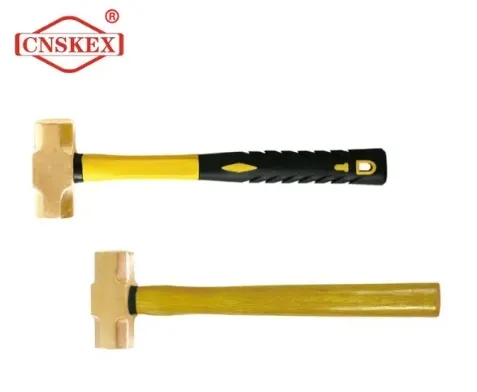Feb. 08, 2024
In automotive work, the use of tools is critical for various tasks, ranging from minor repairs to major overhauls. Among these tools, the non-sparking brass hammer holds a significant place due to its unique properties and safety benefits.
Origins and Composition
The origin of non-sparking brass hammers lies in their composition. These hammers are typically made from a special alloy of copper and zinc, commonly known as brass. The specific composition includes a high percentage of copper, which provides the desired non-sparking characteristics. When compared to steel hammers, brass hammers significantly reduce the risk of sparks, making them suitable for use in environments where flammable materials or gases may be present.
Applications in Automotive Work
Non-sparking brass hammers find extensive application in automotive work, especially in environments where the presence of combustible materials is a concern. Here are some scenarios where these hammers are particularly useful:
Working with Fuel Systems: When working on fuel systems, such as repairing fuel lines or replacing fuel pumps, there's a risk of igniting fuel vapors. The non-sparking nature of brass hammers ensures that accidental sparks won't lead to hazardous situations.

Collision Repair: During collision repair, technicians often need to work near areas where flammable substances like gasoline might have leaked. Using brass hammers minimizes the risk of igniting these substances, enhancing safety in the workshop.
Maintenance of Electrical Systems: Automotive electrical systems can be sensitive to sparks, especially in proximity to batteries or wiring. Non-sparking brass hammers prevent potential damage to electrical components and reduce the risk of fire.
Significance and Impact
The significance of using non-sparking hammers in automotive work cannot be overstated. By incorporating these tools into standard procedures, workshops prioritize safety and minimize the risk of accidents and injuries. The impact of this safety measure extends beyond the immediate workspace:
Worker Safety: By reducing the likelihood of sparks, non-sparking brass hammers protect automotive technicians from potential harm, including burns and explosions.
Property Protection: Minimizing the risk of fire in automotive workshops helps protect valuable equipment, vehicles, and infrastructure from damage.
Regulatory Compliance: Adhering to safety standards and regulations is essential for automotive workshops. Using non-sparking tools demonstrates compliance and a commitment to workplace safety.
In conclusion, the use of non-sparking brass hammers in automotive work is not only a matter of convenience but also a critical safety measure. Their origins in specialized alloy compositions make them indispensable tools, ensuring a safer working environment for automotive technicians and minimizing the risk of accidents and damage.
Previous: 5 Reasons Why Your Business Needs Non-Sparking Slogging Spanners
Next: None
If you are interested in sending in a Guest Blogger Submission,welcome to write for us!
All Comments ( 0 )